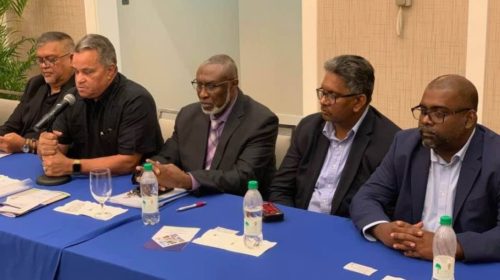
…Guyana’s Private Sector roasts APNU/AFC for failing to honour Constitution 7 months after no-confidence vote passed
The Private Sector Commission (PSC), in its strongest statement yet, on Wednesday slammed the coalition Government for failing to honour the Constitution of Guyana and Caribbean Court of Justice (CCJ) rulings.
According to the Commission, over seven months have elapsed since the No-Confidence Motion (NCM) was passed. Yet, the Government has failed to call a date for elections, which were already several months overdue.
Article 106 (6) of the Constitution of Guyana states: “The Cabinet including the President shall resign if the Government is defeated by the vote of a majority of all the elected members of the National Assembly on a vote of confidence.”
Meanwhile, Article 106 (7) states: “Notwithstanding its defeat, the Government shall remain in office and shall hold an election within three months, or such longer period as the National Assembly shall by resolution supported by not less than two-thirds of the votes of all the elected members of the National Assembly determine, and shall resign after the President takes the oath of office following the election.”
“The Court has made plain that the provisions of our Constitution and “their meaning is clear”, and the Court holds that “it is the responsibility of constitutional actors in Guyana to honour them,” the PSC said in its statement.
“It is the considered view of the Private Sector that this responsibility abides first, and foremost, with President David Granger and that it is his burden and inherent political duty to uphold this responsibility.”
According to the group, it was necessary for the politicians to uphold the rule of law and respect the Constitution, as urged by the international community, to ensure there is no confusion in the country.
“The Court has, quite properly, restrained from “the issuance of coercive orders or detailed directives” to our national leaders, but asserted that it is for the President and, indeed, the Leader of the Opposition “guided by the constitutional imperatives” to ensure that the consequences of the No-Confidence Motion are imposed upon the Government. The Private Sector wishes to note some seven months have passed and they are yet to be acted upon,” the PSC stated.
“The Caribbean Court had earlier ruled that the unilateral appointment by President Granger of the Chairman of the GECOM was “flawed” and that the President, in fact, had, therefore, acted in contravention of the constitutional requirement to appoint the Chairman from six names submitted by the Leader of the Opposition. The Private Sector Commission, therefore, calls upon the President to act expeditiously in fulfilling his constitutional responsibility in this regard.”
Opposition Leader Bharrat Jagdeo had submitted a list of nominees for GECOM Chairperson that included Retired Major General Joe Singh, who served as GECOM Chairman years ago; environmentalist Annette Arjoon-Martins; Retired Justice of Appeal BS Roy; businessman Captain Gerry Gouveia; Attorney-at-Law Kashir Khan; former Magistrate Krishnadatt Persaud; conflict resolution specialist Lawrence Latchmansingh; Retired Major General Norman McLean, businessman Ramesh Dookhoo, Retired Puisne Judge William Ramlall and Onesi La Fleur.
But in a turnaround, President David Granger then submitted an informal list of nominees of his own that featured former GECOM Chairman, Retired Justice James Patterson, in addition to Retired Justices Claudette La Bennett and Stanley Moore, Georgetown Public Hospital Corporation (GPHC) Chairperson and Attorney Kesaundra Alves, economist Aubrey Armstrong and former Solicitor General Kim Kyte. The President also proposed known People’s National Congress (PNC)-affiliates and businessmen Stanley Ming (a former PNC parliamentarian) and Kads Khan.
While the Constitution does not allow the President to submit names, Jagdeo in a compromise agreed to consider the President’s suggestion of names in an informal process.
The President subsequently gave his no-objection to four of Jagdeo’s nominees. Alves and La Bennett were then put forward by the President as shortlists of his own. However, the Opposition Leader has since deemed these two nominees as “unacceptable” to him, with the likelihood that he would submit another list of names to the President.
Meanwhile, pressure has been continually mounting on the Government to uphold the Constitution and set a date for elections. Among those urging the Government to do the right thing are the international community, the trade unions, the parliamentary opposition, and sections of society.



